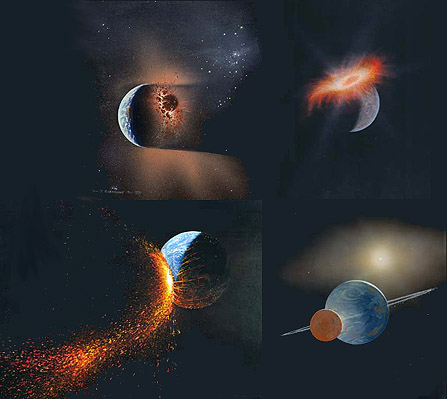March 13, 2015
Forming the Moon
Originally published March 12, 2004
Image Credit: Bill Hartmann |
|
Forming the Moon Bill Hartmann isn't really that old, but from his paintings of the formation of the Moon you might think he witnessed the event 4.5 billion years ago. As a leading planetary scientist and a skilled artist, Hartmann uses paintings to visualize scientific understanding and hypotheses. These four paintings illustrate conceptual stages in the birthing of our Moon. The upper left shows the moment of impact as a Mars-size planetesimal smashed into the early Earth. One half hour later (upper right) the planetesimal is consumed and shock waves race thru the Earth. Five hours after impact, silicate vapors from the Earth and the impactor are still being sprayed into space from the impact site (bottom left). Sometime later, some of the condensed silicates that created a ring around the Earth have accreted to form a moon, our Moon, which is still molten from the energy of millions of collisions. The remaining ring particles will be sucked up by the Moon, re-enter Earth's turbulent atmosphere, or be ejected out of Earth's orbit. Now does the early period of intense cratering and total melting of the Moon make sense? Technical Details: Related Links: Yesterday's LPOD: Where is Yesterday's LPOD? Tomorrow's LPOD: First Light on a Nearly Full Moon |
|
Author & Editor: |
COMMENTS?
Register, Log in, and join in the comments.




